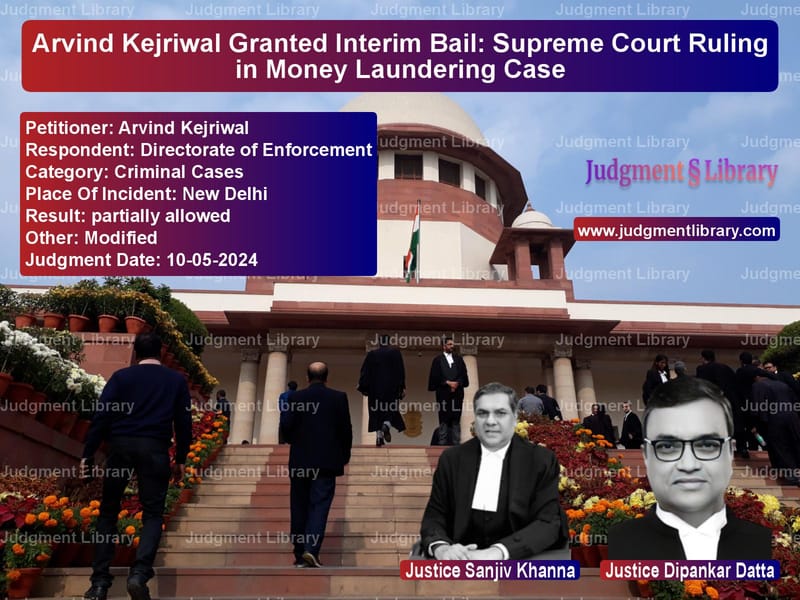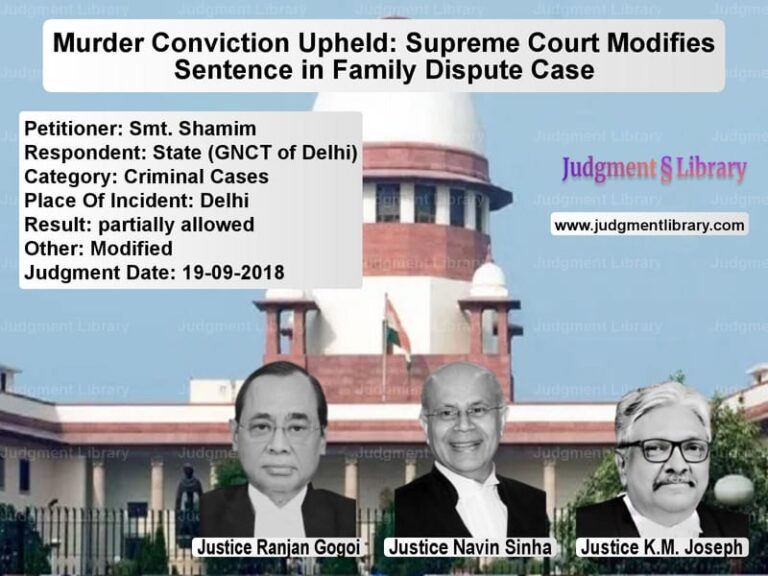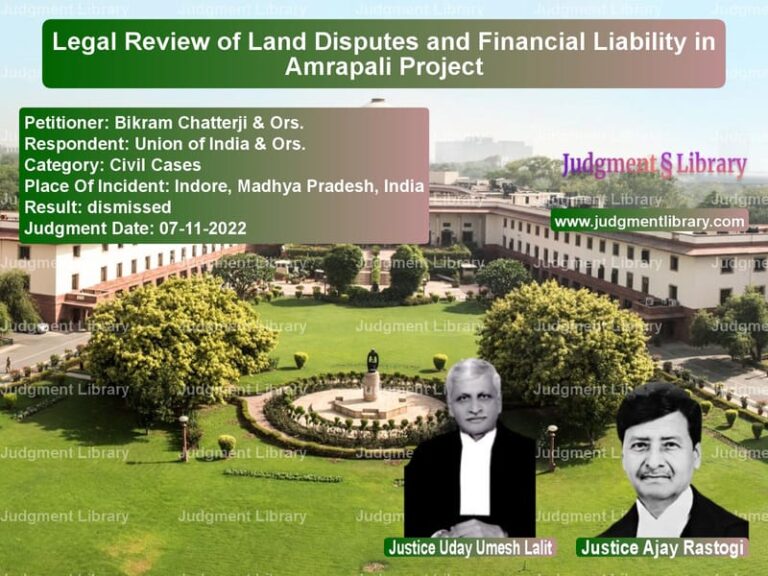Arvind Kejriwal Granted Interim Bail: Supreme Court Ruling in Money Laundering Case
The case of Arvind Kejriwal vs. Directorate of Enforcement marks a significant judicial intervention in an ongoing investigation into alleged money laundering. The Supreme Court’s ruling granted interim bail to Delhi Chief Minister Arvind Kejriwal, emphasizing constitutional rights, electoral significance, and procedural fairness. This case highlights the intersection of law enforcement, politics, and individual liberty in a democratic framework.
Background of the Case
Arvind Kejriwal was arrested by the Directorate of Enforcement (DoE) on March 21, 2024, in connection with an ongoing investigation under the Prevention of Money Laundering Act, 2002 (PMLA). The DoE had registered an Enforcement Case Information Report (ECIR) following a predicate offense lodged by the Central Bureau of Investigation (CBI) on August 17, 2022. The case stemmed from a complaint by the Lieutenant Governor of Delhi regarding alleged irregularities in excise policy formulation and execution.
The trial court and the Delhi High Court upheld Kejriwal’s arrest, leading to an appeal before the Supreme Court. Given the complexities of the legal and constitutional questions involved, the Supreme Court decided to examine the case in detail. However, due to the ongoing Lok Sabha elections, the Court considered the necessity of interim bail for Kejriwal.
Legal Issues Considered
- Whether Kejriwal’s arrest violated the procedural safeguards under Section 19 of the PMLA.
- Whether the ongoing general elections justified an exceptional intervention through interim bail.
- Whether Kejriwal’s failure to appear despite multiple summonses impacted his legal standing.
- Whether granting interim bail would establish an unfair precedent favoring politicians.
Arguments by the Petitioner
Kejriwal’s legal team contended:
- The arrest was politically motivated and lacked substantive evidence under PMLA.
- There was no immediate necessity for custody since the investigation had been ongoing since 2022.
- The timing of the arrest, coinciding with the Lok Sabha elections, aimed to undermine his party’s electoral prospects.
- His non-appearance in response to nine summonses did not justify an arrest without first exhausting all legal remedies.
- The arrest infringed upon his constitutional rights, including the right to participate in elections.
Arguments by the Directorate of Enforcement
The DoE presented counterarguments emphasizing:
- Kejriwal’s repeated failure to appear for questioning despite nine summonses issued since October 2023.
- The gravity of the allegations involving financial mismanagement and money laundering.
- The principle that politicians should not receive preferential treatment in legal proceedings.
- Concerns that interim bail could interfere with the integrity of an ongoing investigation.
Supreme Court’s Findings
The Supreme Court took a balanced approach, considering the implications of the ongoing elections and the legal merits of Kejriwal’s case.
1. Interim Bail and the Election Factor
The Court acknowledged that the Lok Sabha elections were a crucial democratic exercise involving nearly 970 million voters. Given Kejriwal’s role as the Chief Minister of Delhi and leader of a national political party, the Court found that denying him an opportunity to campaign would significantly impact democratic participation.
2. Legal Precedents on Interim Bail
The Court cited precedents emphasizing that interim bail can be granted in exceptional circumstances, particularly when constitutional rights are at stake. It referenced:
- Mukesh Kishanpuria vs. State of West Bengal – Affirming the power to grant interim bail as an extension of regular bail provisions.
- Sunil Fulchand Shah vs. Union of India – Establishing that preventive detention should be exercised with restraint.
- Dadu vs. State of Maharashtra – Recognizing courts’ discretion to grant temporary relief in cases involving fundamental rights.
3. Procedural Fairness Under PMLA
The Court did not make a final determination on the legality of Kejriwal’s arrest but noted that such issues required a detailed examination. It observed that the arrest’s timing and circumstances raised concerns about procedural fairness.
Final Ruling: Conditions for Interim Bail
Given the extraordinary circumstances, the Supreme Court granted interim bail to Kejriwal until June 1, 2024, with the condition that he must surrender on June 2, 2024. The bail was subject to strict conditions:
- Kejriwal must furnish a bail bond of Rs. 50,000 with one surety of the same amount.
- He is prohibited from visiting the Chief Minister’s office or the Delhi Secretariat.
- He cannot sign official files unless necessary for clearance by the Lieutenant Governor.
- He must refrain from making public statements regarding his involvement in the case.
- He must not interact with any witnesses or access official files related to the investigation.
Implications of the Judgment
- Legal Precedent: The ruling clarifies that courts can consider electoral participation as a factor in interim bail decisions.
- Separation of Powers: It reaffirms the judiciary’s role in ensuring procedural fairness in politically sensitive cases.
- Accountability: While granting bail, the Court ensured that Kejriwal remained restricted from influencing official matters.
Conclusion
The Supreme Court’s decision to grant interim bail to Kejriwal strikes a balance between upholding legal accountability and safeguarding democratic participation. While it does not preclude further legal scrutiny into the allegations against him, it ensures that procedural fairness is maintained. The ruling underscores that judicial discretion in interim bail matters must be exercised in a manner that respects constitutional values and the integrity of the legal system.
Petitioner Name: Arvind Kejriwal.Respondent Name: Directorate of Enforcement.Judgment By: Justice Sanjiv Khanna, Justice Dipankar Datta.Place Of Incident: New Delhi.Judgment Date: 10-05-2024.
Don’t miss out on the full details! Download the complete judgment in PDF format below and gain valuable insights instantly!
Download Judgment: arvind-kejriwal-vs-directorate-of-enfor-supreme-court-of-india-judgment-dated-10-05-2024.pdf
Directly Download Judgment: Directly download this Judgment
See all petitions in Money Laundering Cases
See all petitions in Bail and Anticipatory Bail
See all petitions in Public Interest Litigation
See all petitions in Judgment by Sanjiv Khanna
See all petitions in Judgment by Dipankar Datta
See all petitions in partially allowed
See all petitions in Modified
See all petitions in supreme court of India judgments May 2024
See all petitions in 2024 judgments
See all posts in Criminal Cases Category
See all allowed petitions in Criminal Cases Category
See all Dismissed petitions in Criminal Cases Category
See all partially allowed petitions in Criminal Cases Category







